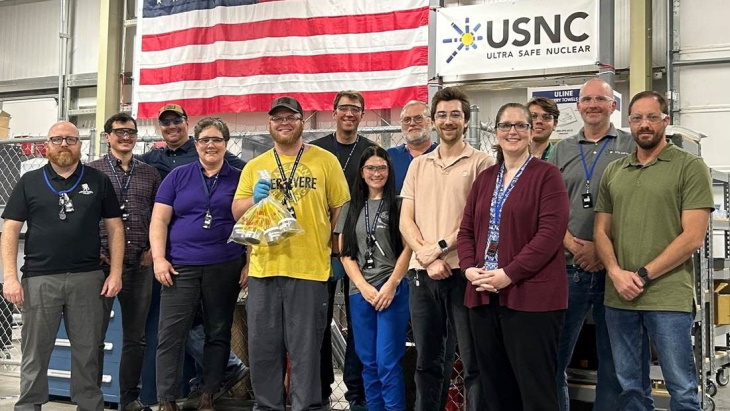Ultra Safe Nuclear Corporation (USNC) has delivered uranium nitride coated uranium oxycarbide tristructural isotropic (TRISO) fuel to NASA's Space Nuclear Power and Propulsion programme. The company says this demonstrates the "flexibility, precision and value" of its Pilot Fuel Manufacturing Facility (PFM).

(Image: USNC)
The fuel particles supplied to NASA were small-diameter uranium nitride kernels with a tri-structural zirconium carbide outer coating surrounding pyrolytic carbon and porous carbon buffer layers.
"Past attempts by industry to leverage uranium nitride fuel without tri-structural coatings resulted in failure at temperatures well below predicted or desired performance levels," USNC noted. "NASA is optimistic that this more robust fuel form will unlock higher performance regions at lower cost for future space nuclear efforts."
"It's great to see industry stepping up with investment in infrastructure that delivers," said Jason Turpin, Space Nuclear Propulsion Program Manager for NASA. "Advanced capabilities like the Pilot Fuel Manufacturing facility mean more tools in the nuclear thermal propulsion (NTP) toolbox and that provides a shorter and clearer path to success."
NTP for spaceflight has a number of advantages over chemical-based designs, primarily providing higher efficiency and greater power density resulting in lower propulsion system weight. This would contribute to shorter travel times and lower exposure to cosmic radiation for astronauts, enabling deep space missions such as crewed missions to the Moon and Mars.
"We designed our process and facility specifically to be both scalable and flexible to meet the needs of a rapidly expanding market for advanced coated particle nuclear fuels," said Kurt Terrani, USNC's Executive Vice President for fuel development. "I'm proud of the team and our ability to serve and support NASA and its important missions. We are ramping up fast and further to extend the benefits of advanced nuclear fuel solutions here on Earth."
USNC said it was able to "leap past lab-scale deployment and set up a single line of production-scale equipment within 15 months" by "leveraging an experienced team and many technologies both with roots going back to Oak Ridge National Laboratory".
Located at the East Tennessee Technology Park at Oak Ridge, Tennessee, the PFM will support USNC in the near term across a number of areas including the manufacture of Qualification Fuel test articles for its Micro-Modular Reactor (MMR). It also serves to hone the production-scale equipment and support the licensing activities for the recently announced planned joint venture with Framatome for large-scale production of TRISO-based fuels. The PFM was declared open in August last year.
Seattle-headquartered USNC is working to demonstrate MMR energy systems at Canadian Nuclear Laboratories' Chalk River site, in partnership with Ontario Power Generation, and at the University of Illinois. The company is also working on new projects to deploy its technology elsewhere in Canada and the USA, as well as in Europe.
USNC says uranium nitride is a candidate particle fuel for high-performance nuclear reactors due to its much higher thermal stability and higher uranium density than other fuels. It has long been explored for future terrestrial and space reactor applications.
"The flexibility of PFM allows it to produce a full range of candidate particle fuels - including uranium carbide, uranium nitride and uranium oxycarbide - along with a variety of coatings, including silicon and zirconium carbides," the company said.
Researched and written by World Nuclear News